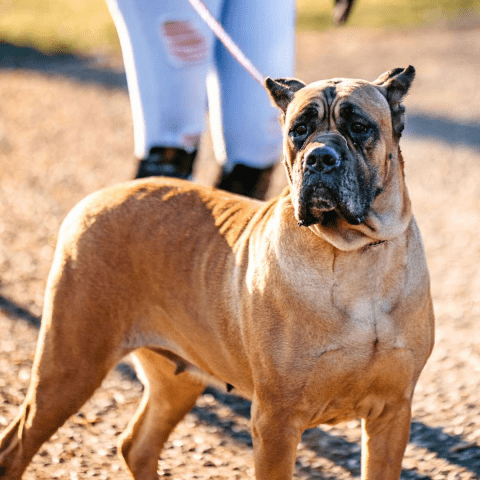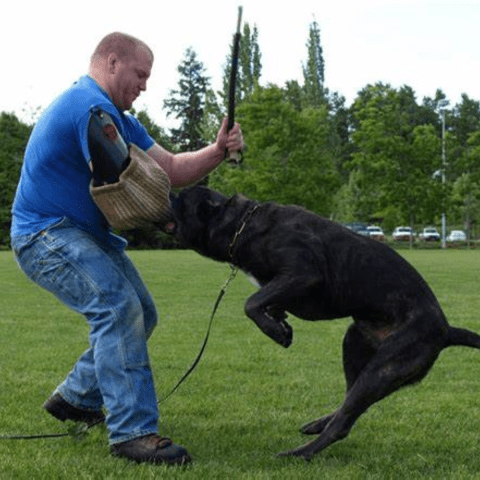Did you know that a staggering 70% of dog owners claim their pets have behavioral issues? As a Cane Corso owner, you’re likely no exception. Developing a personalized training plan tailored to your dog’s unique needs and temperament is key to addressing these issues and fostering a strong, healthy bond. But where do you start? By understanding your Corso’s strengths, weaknesses, and breed-specific traits, you can create a customized approach that targets areas like socialization, agility, and obedience. But what specific steps can you take to create an effective plan, and how will you know you’re on the right track?
Understanding Your Cane Corso’s Temperament
As you bring your Cane Corso home, essential to understand that their temperament is shaped by a combination of genetic and environmental factors, making it imperative to identify and appreciate their unique personality traits. Their breeding history has instilled in them a strong instinct to please and protect, but it’s fundamental to recognize that each dog has its own emotional intelligence. This intelligence influences how they interact with their human family and other animals, establishing a social hierarchy within the pack.
Understanding your Cane Corso’s pack dynamics is essential in building a strong bond. As the pack leader, you must establish clear boundaries and communicate effectively. Recognizing your dog’s emotional cues will help you respond appropriately, fostering trust and respect. By acknowledging their individual temperament, you’ll be better equipped to tailor your training approach, addressing their specific needs and strengthening your relationship. By doing so, you’ll create a harmonious household where your Cane Corso feels valued and understood.
Identifying Breed-Specific Traits and Needs

As you develop a personalized training plan for your Cane Corso, bear in mind that you must take into account the breed’s unique characteristics that impact their learning style and behavior. You’ll want to focus on their physical characteristics, such as their athletic build and short coats, which affect their exercise needs and sensitivity to weather conditions. Additionally, understanding their temperament traits, like their loyalty and protectiveness, will help you tailor your training approach to their individual needs.
Physical Characteristics
Your Cane Corso’s muscular build, athletic physique, and distinctive coat patterns are just a few of the breed-specific traits that influence their exercise needs and training requirements. As an owner, understanding these physical characteristics is vital to create a tailored training plan.
Your Cane Corso’s body type, for instance, is characterized by a muscular build, which demands regular exercise to maintain muscle tone. Their coat patterns, whether fawn, brindle, or black, may require specific grooming needs. The breed’s head shape, with its distinctive flat skull and pronounced stop, affects their respiratory system, making breathing exercises vital. Their ear size, proportionate to their head, requires regular cleaning to prevent infections. The breed’s tail length, typically docked to prevent injury, influences their balance and agility. Paw size, proportionate to their body, demands regular nail trimming to prevent overgrowth. Furthermore, their bone structure, with its sturdy joints, requires exercises that promote flexibility and strength. By acknowledging these physical characteristics, you can tailor your Cane Corso’s training plan to meet their unique needs, fostering a stronger bond and a healthier, happier dog.
Temperament Traits
Cane Corsos are known for their confident, intelligent, and loyal nature, which makes them highly trainable, but also requires consistent socialization and positive reinforcement to channel their strong will and energy productively.
Understanding your Cane Corso’s temperament traits is vital in creating an effective training plan. Here are some key characteristics to keep in mind:
- Fear responses: Cane Corsos can be sensitive to loud noises and harsh corrections, so positive reinforcement techniques are vital to build confidence and trust.
- Socialization techniques: Socialization is imperative in helping your Cane Corso develop emotional intelligence and reduce fear responses. Expose your dog to various environments, people, and situations to help them become calm and confident in new situations.
- Emotional intelligence: Cane Corsos are highly attuned to their owner’s emotions, making them excellent companions. However, this also means they can pick up on anxiety and stress, so maintaining a calm and patient demeanor during training is necessary.
- Breed comparisons: Compared to other breeds, Cane Corsos are known for their loyalty and protective instincts, making them excellent guard dogs. However, this also means they require early socialization to prevent fear aggression.
- Energy levels: Cane Corsos are high-energy dogs that require regular exercise and mental stimulation to prevent boredom and destructive behavior.
Setting Realistic Training Goals and Objectives
You need to establish clear, achievable training goals and objectives to facilitate your Cane Corso’s development and your own training success. Goal setting is a vital step in creating a personalized training plan, as it helps you focus on what you want to achieve and how to get there. Start by identifying what you want to accomplish with your Cane Corso, whether it’s basic obedience, agility training, or addressing behavioral issues. Be specific and realistic about what you can achieve in a given timeframe.
Create a training timeline to help you stay on track and monitor progress. Break down larger goals into smaller, manageable tasks to make training more enjoyable and productive. Consider your Cane Corso’s age, breed characteristics, and individual temperament when setting goals, and adjust your expectations accordingly. By setting realistic goals and objectives, you’ll be motivated to work towards them and celebrate your achievements along the way. A well-structured training plan will help you build a stronger bond with your Cane Corso and tap their full potential.
Assessing Your Corso’s Current Skill Level
As you begin creating a personalized training plan for your Cane Corso, assessing your dog’s current skill level is crucial. You’ll want to identify what your Corso already knows and what they still need to learn, which will help you pinpoint knowledge gaps and areas that require improvement. By evaluating your dog’s current skills, you’ll be able to create a tailored plan that addresses their specific needs and sets them up for success.
Current Skills Assessment
Regularly evaluating your Corso’s current skill level helps identify areas of strength and weakness, providing a solid foundation for a personalized training plan. This assessment is essential in understanding what your Corso already knows and what needs improvement. By doing so, you’ll create a tailored training plan that addresses specific needs, rather than following a one-size-fits-all approach.
To conduct a thorough assessment, consider the following aspects of your Corso’s skills:
- Basic Obedience: Can your Corso respond to basic commands like ‘sit,’ ‘stay,’ and ‘come’?
- Socialization: How well does your Corso interact with people, other dogs, and new environments?
- Leash Manners: Does your Corso walk calmly by your side, or do they pull on the leash?
- Problem Behaviors: Are there any undesirable behaviors, such as barking, digging, or chewing, that need attention?
- Agility and Fitness: Is your Corso physically fit, and can they navigate obstacles or perform simple agility tasks?
Identifying Knowledge Gaps
By pinpointing your Corso’s knowledge gaps, you can create a targeted training plan that bridges the divide between their current skills and desired behaviors. Identifying knowledge deficiencies is essential in developing an effective training strategy. To do this, assess your Corso’s current skill level in various areas, such as obedience, agility, and socialization.
| Skill Area | Current Level | Desired Level |
|---|---|---|
| Basic Obedience | Novice | Advanced |
| Agility Training | Beginner | Intermediate |
| Socialization | Limited | Confident |
Choosing the Right Training Methods
You’ll need to take into account your Cane Corso’s unique personality, temperament, and learning style when selecting the right training methods to guarantee a successful and enjoyable experience for both you and your dog.
When it comes to choosing the right training methods, it’s essential to consider your dog’s individual needs and preferences. Here are some key factors to keep in mind:
- Positive Reinforcement Training: Focuses on rewarding good behavior with treats, praise, and affection. This approach is ideal for Cane Corsos, as they thrive on positive reinforcement.
- Clicker Training: A method that uses a small device that makes a distinct sound to mark desired behavior, making it easier to communicate with your dog.
- Puppy Socialization: A critical period between 8-11 weeks where your puppy learns to interact with new people, dogs, and environments.
- Agility Training: A fun way to provide physical exercise and mental stimulation through obstacle courses.
- Consistency and Repetition: Establish a routine and stick to it, as Cane Corsos responds well to structure and clear boundaries.
Developing a Customized Training Schedule

With a clear understanding of your Cane Corso’s individual needs and preferences, it’s time to create a customized training schedule that suits their unique personality and learning style.
To develop an effective training schedule, start by creating a Training Calendar that outlines specific training sessions and goals for each week. Divide your calendar into manageable chunks, focusing on one or two skills per session. This will help you stay organized and maintain consistent progress.
When structuring your training sessions, consider your Cane Corso’s attention span and energy levels. Aim for sessions that are 10-15 minutes long, with regular breaks to prevent boredom and frustration. A well-structured Session Structure should include a clear introduction, training exercises, and a conclusion that reinforces learned behaviors. Be flexible and willing to adjust your schedule as needed, as every dog learns at their own pace. By tailoring your training schedule to your Cane Corso’s unique needs, you’ll set them up for success and strengthen your bond.
Positive Reinforcement Techniques and Tools
Reward-based training methods lie at the heart of successful Cane Corso development, as they foster a strong, trusting relationship between you and your dog. By focusing on positive reinforcement techniques, you’ll create a training environment that’s engaging, effective, and enjoyable for both you and your Cane Corso.
To get started, consider the following tools and techniques:
- Clicker Training: A powerful tool that associates a distinct sound with a reward, helping your Cane Corso quickly learn new behaviors.
- Reward Markers: Verbal cues, such as “yes” or “click,” that immediately follow desired behaviors, marking the exact moment your dog performs the action.
- Treat Dispensing Toys: Interactive toys that challenge your Cane Corso and provide mental stimulation, while rewarding problem-solving skills.
- Life Rewards: Using everyday activities, like meals or walks, as rewards for good behavior, making training a seamless part of your daily routine.
- Target Training: Teaching your Cane Corso to touch a target stick or other object, allowing for precise control and clear communication.
Building a Stronger Bond Through Exercise
As you develop a personalized training plan for your Cane Corso, recognizing that exercise plays a critical role in strengthening the bond between you and your dog is crucial. By understanding your Cane Corso’s exercise needs, you’ll be able to create a routine that not only meets their physical requirements but also fosters a deeper connection. Through regular exercise, you’ll build trust and rapport with your dog, laying the foundation for a stronger, more resilient bond.
Cane Corso Exercise Needs
Your Cane Corso needs regular exercise to stay physically and mentally stimulated, and a well-structured exercise plan can help strengthen the bond between you and your dog. A daily routine that incorporates physical activity and mental stimulation can help prevent boredom, destructive behavior, and anxiety.
Here are some exercise ideas to get you started:
- Morning Walks: Start the day with a 30-minute walk to get your Cane Corso’s energy out.
- Playtime: Engage in play activities like fetch, tug-of-war, or hide-and-seek to mentally stimulate your dog.
- Outdoor Adventures: Take your Cane Corso on outdoor adventures like hiking, swimming, or jogging to provide a change of scenery and exercise.
- Agility Training: Set up an obstacle course in your backyard or sign up for agility classes to challenge your dog physically and mentally.
- Evening Stretch: End the day with a relaxing evening stretch to help your Cane Corso unwind.
Strengthening Owner-Dog Bond
Through shared physical activity, you can forge a deeper connection with your Cane Corso, fostering a sense of trust and understanding that transcends words. As you engage in exercises together, you’ll build a stronger emotional connection, laying the foundation for a lifelong bond. Trust building is a key aspect of this process, as your Cane Corso learns to rely on you for guidance and support.
When you exercise with your dog, you’re not just improving their physical health; you’re also nurturing a deeper emotional connection. This connection is rooted in trust, which is essential for effective communication and training. By participating in activities that challenge and engage your Cane Corso, you’ll strengthen your bond, creating a sense of unity and togetherness. As you work together, you’ll develop a more intuitive understanding of each other’s needs and preferences, allowing you to tailor your training approach to your dog’s unique personality and learning style. By prioritizing trust building and emotional connection, you’ll create a strong, lasting bond with your Cane Corso.
Managing Common Behavioral Challenges
Cane Corsos, with their strong prey drive and independent nature, can exhibit stubbornness, making obedience training a challenge. As you work on strengthening your bond with your Cane Corso, you must be aware of common behavioral challenges that may arise.
Some common issues you may encounter include:
- Fearful aggression: Your Cane Corso may display fearful aggression due to lack of socialization or past traumatic experiences.
- Separation anxiety: Your dog may suffer from separation anxiety, leading to destructive behavior when left alone.
- Resource guarding: Cane Corsos can be protective of their food and toys, making resource guarding a common issue.
- Pulling on the leash: With their strong prey drive, Cane Corsos may pull on the leash, making walks challenging.
- Digging and destructive behavior: Boredom, anxiety, or excess energy can lead to destructive behavior like digging and chewing.
Monitoring Progress and Making Adjustments
As you implement your personalized training plan, consistently tracking your Cane Corso’s progress allows you to identify areas that require adjustments and celebrate successes. By monitoring your dog’s development, you’ll be able to refine your approach and make data-driven decisions. Tracking milestones, such as mastering basic obedience commands or overcoming fear-based behaviors, helps you stay motivated and focused on your goals.
As you track progress, you may find that your Cane Corso is progressing faster or slower than expected. This is where adjusting pace comes in. If your dog is struggling with a particular concept, you can slow down and provide additional support. Conversely, if they’re exceling, you can accelerate the training process. By regularly evaluating your dog’s progress, you’ll be able to refine your approach, making adjustments as needed to facilitate effective learning.
Frequently Asked Questions
How Often Should I Exercise My Cane Corso Puppy?
You should exercise your Cane Corso puppy 2-3 times daily, with short 10-15 minute sessions, focusing on Puppy Socialization, Puppy Playtime, and Outdoor Adventures to promote a well-rounded and happy pup.
Can I Train My Corso With a Shock Collar?
You should avoid using shock collars on your Cane Corso, as they can cause physical and emotional harm. Instead, focus on positive reinforcement training methods that promote trust, respect, and a strong bond between you and your dog.
What’s the Ideal Age to Start Formal Training?
You’re probably thinking you can wait until your Cane Corso is a bit older, but don’t delay – socialization windows open as early as 8 weeks, and breed standards dictate early training for ideal development.
How Do I Handle Food Aggression in My Corso?
You’ll need to address food aggression in your Corso by identifying resource guarding triggers, then applying gentle, patient socialization techniques to desensitize them to mealtime interactions, gradually building trust and confidence.
Can I Train My Corso to Be a Therapy Dog?
As you set out on a journey to cultivate compassion, you can train your Corso to be a therapy dog, obtaining therapy certification and providing emotional support, allowing you to share the unconditional love of your loyal companion with those in need.
Conclusion
As you set out on this training journey with your Cane Corso, remember that every step forward is a brick laid on the path to a stronger bond and a well-adjusted companion. By embracing your dog’s unique temperament and needs, you’ll tap into their full potential. And when challenges arise, recall that every setback is an opportunity to refine your approach, to adapt, and to grow together.
